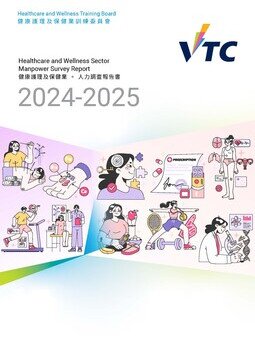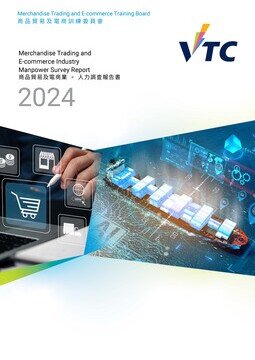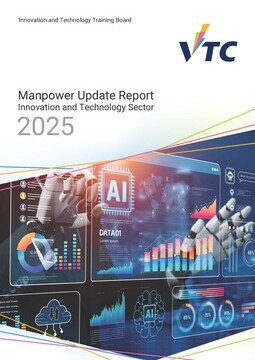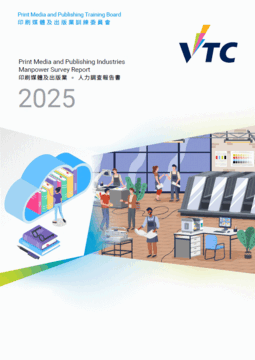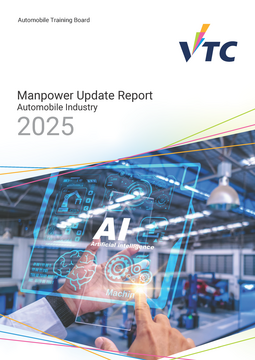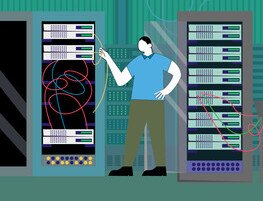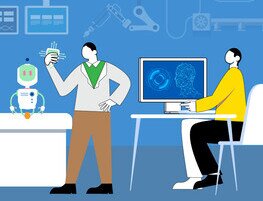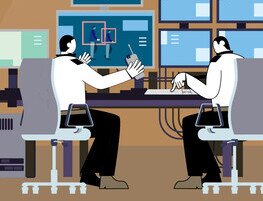Recommendation
Training Needs
- Information Technology -
1st
Application Development Tools / Programming Languages
2nd
Applied Basic IT Tools for Business Processes
3rd
Information and System Security
1st
Application Development Tools / Programming Languages
2nd
Information and System Security
3rd
Project Management and Design
- Research and Development -
1st
Technical Skills
2nd
Design Thinking
3rd
Research Methodology
1st
Research Methodology
2nd
Design Thinking
3rd
Technical Skills
Request listed companies engaging innovation and technology businesses to bring non-local talents to Hong Kong
Bringing together talents from around the world is important to strengthening Hong Kong’s competitiveness and development. The Government should consider including a special requirement on the Main Board and Growth Enterprise Market Listing Rules that companies engaging in innovation and technology businesses will have to bring a certain number of R&D experts from overseas or Mainland China and/or recruiting a certain number of local R&D employees before they can be listed on the Main Board or Growth Enterprise Market in Hong Kong.Tax Reduction or other Incentives to Encourage those Graduates Studying in the Mainland China to return to Hong Kong after graduation
Apart from attracting the overseas young talents to work in Hong Kong, there are quite a number of children of Hong Kong residents receive professional training in the Mainland cities, the Government should consider formulating policies to provide talents with housing allowance and tax reduction so as to attract them to pursue career development in Hong Kong or GBA cities.“Business-to-Government” or “Government-to-Business” business model
“Business-to-Government (B2G)” model provides a platform for businesses to sell products and services to the Government while “Government-to-business (G2B)” model means the Government selling to businesses. The G2B partnership is effective for Government particularly to deliver infrastructure services. The Government will seek innovation that private sector can deliver and can put more investments in innovation and technology and boost up the industry development by offering more attempts on innovation products.Educate the Public the Vision of Innovation and Technology Development in Hong Kong
The Government should continue to promote its vision of being the international innovation and technology hub and the promising opportunities that innovation and technology sector could offer to the public, particularly, the workforce and the young generation as well as the parents. The Government should lead and develop joint promotion and collaboration with Hong Kong’s leading research and development centres and institutions, such as Hong Kong Science Park, Cyberport, Hong Kong Productivity Council and Hong Kong Applied Science and Technology Research Institute Company Limited as well as the five Government funded R&D centres.Relax Immigration Arrangements for Non‑local Sub-degree Graduates
In Policy Address 2022, the Immigration Arrangements for Non‑local Graduates will be relaxed by extending the limit of stay from one year to two years to facilitate their staying in or coming to Hong Kong for work; and expand the scope of the arrangements to cover those who graduated from the GBA campus of a Hong Kong university on a pilot basis for a period of two years. The Training Board considers that such initiatives are conducive to attract non-local talents to start their careers in Hong Kong, however, it is worth considering extending to cover more non-local talents, especially for those non-local sub-degree graduates who should also be allowed to stay two years in Hong Kong to explore employment opportunities.Provide More Resources to Train up Technical Workforce
By giving more recognition of sub-degree holder, the Government should also consider lowering the entry requirement from degree to sub-degree holder for some technical roles which are more focused on hands-on skills and knowledge instead of only academic qualifications.
Nurture and Build up the Technical Workforce
It is crucial for Training Institutions to engage students with strong foundation of programming and coding skills so that they fully understand the principles behind and acquire detailed knowledge. By doing so, students will be able to manage and response to the rapidly changing programming languages in ease. Besides, students should be able to demonstrate digital literacy on computer hardware, operating systems, network infrastructure and security, database software, internet web publishing, etc.Enhance the curriculum for students to learn the advanced technology developed in Mainland China
In order to develop students’ capabilities in working at technology firms in GBA cities, the curriculum should be extended by covering more advanced technology and technology platforms built in the Mainland China in addition to those Western platforms and software. Students should get familiar with its technology, particularly, the software developed in the Mainland has been highly competitive and increasingly adopted in Hong Kong with a number of tech giants like, Alibaba, Baidu, Huawei, Tencent, Xiaomi, Kingdee, etc.Develop interdisciplinary curriculum to equip students of non-IT disciplines with IT and Technology knowledge and skills
In today’s technology-driven economy, Training Board considers that IT skills are one of the generic skills that students must be possessed in order to stay competitive in the workforce. In this connection, interdisciplinary curriculum should be developed to equip students of non-IT disciplines with basic IT and technology knowledge and skills, particularly learning to code.Offer more project-based and authentic learning experience
Project-based learning gives students the opportunity to develop skills and knowledge through engaging them in problems and situations they may face in the real working environment. To facilitate students to acquire the necessary skills and knowledge needed for innovation and technology development, authentic learning experience should be prepared and created to train up the critical thinking and research and collaboration skills.Be forward-looking in equipping students with future skills and competencies required
Apart from hard skills, training institutions should develop students with creativity, imagination, curiosity and resilience. They will have to be educated to be respect and ethical, appreciate the ideas and values of the others and also to cope with failure and rejection when developing innovative products and solutions.Provide In-Service Training on IT Certificates recognised in Mainland China
As more and more companies are using software and solution from the Mainland China, the demand on professional certifications recognised in Mainland China are on the rise. Training institutions should provide more training to IT practitioners to assist them in gaining professional recognition of their qualifications and making them more competitive and employable in the market by learning hands-on practice of the Mainland China’s software and solution.Offer Upskilling and Reskilling Training
Training institutions should continue to organise training to help individuals enhance digital skills and adapt to use digital tools, especially for those who work in traditional jobs to cope with the automation and digital transformation.Promote the programmes to parents by collaboration with leading companies
The training institutions should work with leading companies in the innovation and technology sector to promote the promising careers that are happening in various industries in order to spark interest from parents. By doing so, parents could exert a much more direct influence on their children’s career choices by advising them to study science and technology subjects and pursue in innovation and technology related career pathways.Embrace teachers with innovative mindset
By nurturing teachers with innovative mindset, teachers will be able to lead high quality project-based learning and focus on fostering students’ innovation by strengthening critical thinking, creativity, curiosity and deep understanding as well as questioning skills in the curriculum as the key learning outcomes, which are all important attributes for innovation and technology personnel.
Promote innovation and technology achievements in Hong Kong
The industry should work together to promote the local innovation and technology achievements to the public and showcase how their research and development efforts have a significant impact on the economic prosperity and the quality of life being enjoyed by members of the public.Support community events in innovation and technology development
The industry should also provide more support to community events to let the young generation experience technology achievements and cutting-edge innovations in Hong Kong, in turn attracting more students to study in STEM related subjects.
Share best practice and innovative products
Employers are encouraged to share their best practices to their employees and industry partners on innovation and technology development. Sharing best practices can help companies identify knowledge gaps, improve efficiency and productivity and encourage leadership.Offer intensive on-the-job training to employees and invest on employee development
Employers should invest more in employee development such as training the workforce on new technologies and strategies or provide skill-based on-the-job training to improve work performance.Partner with training institutions to offer more support to R&D professionals with business and market sense
In order to effectively commercialise the research results, employers should partner with training institutions to offer more support to R&D professionals to equip them with business and market knowledge. More proactive support from employers would be crucial to combine research activities with production activities of companies so as to improve the quality of research activities and implement feasible innovation projects or solutions based on the research and technological development results.Implement flexible work arrangements
Flexible work arrangements have become a hot topic in modern workplaces due to COVID-19 pandemic. More companies are implementing flexible work arrangements with a view to enhancing employee satisfaction and retention, increasing recruitment flexibility, reducing operating costs.Apply the Government funding schemes
Employers are advised to proactively apply and utilise the Government funding schemes to maximise their resources for innovation adoption. With the funding support from the Government, employers are able to implement innovative solutions and digital transformation by adopting different technologies to strengthen their competitiveness and cope with the challenges.
Be lifelong learners and be persistent
Lifelong learning is key to success for employees to maintain a competitive edge in new technologies and grow through continuous application of knowledge and experience. In fact, lifelong learning requires embracing opportunities to learn and put into practice. There are different ways to achieve lifelong learning such as self-motivated learning through online learning platforms, books and training. It could be in another form of professional learning through networking and industry news and pursuing professional certification and qualifications.Broaden own horizons by exploring different opportunities
Innovation values new ideas and different perspectives. Employees should grasp different opportunities to broaden their horizons to experience innovation and technology development in other GBA cities and countries.Be innovative at work and engage in more projects in building up experiences
Employees are recommended to engage in diversified projects and gain more skills and experiences to build up their own technology capabilities for future development.Be mentors at workplace to share and cultivate innovative culture
Employees should consider themselves as one of the drivers to cultivate innovative culture. Building up an innovative culture will facilitate innovative ideas and processes as well as make people more engaged and productive. Employees should work hand in hand with employers to create innovation and make the difference for the industry and for the community.Be proactive and develop problem solving skills
Apart from the technical skills needed for the innovation and technology development, employees should possess proactive problem solving skills to anticipate and resolve challenges independently. In this connection, the employees should be more proactive in using data to analyse the root cause to problem and seek a favourable solution for business prosperity. Establishing positive rapport and building strong relationships with the whole team are key attributes that employers are looking for innovation and technology professionals.Develop genuine interests in innovation
Employees with genuine interest in innovation will have the motivation and desire to deeply understand the current technology and explore new technologies themselves. Employees, especially fresh graduates, who wish to join the sector, should consider their interest areas before pursuing a career choice which can lead to professional success and personal satisfaction. In addition, fresh graduates should have to know that not everyone needs to be entrepreneurs. There are many people who are succeeding in contributing their skills and knowledge into work that could also make a difference to the sector, especially, for those without entrepreneurial spirit to take risks and invest their lives in creating businesses and growing businesses.





